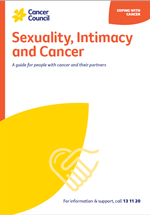Sexuality, intimacy and cancer
Cancer – and some treatments for cancer – can affect your sex life and relationships. In this section you’ll find information about intimacy, as well as practical ways to adapt to physical or emotional changes you may experience.

Download PDF
Print these questions
Sexuality during treatment
- Will this treatment affect my sex life, libido or sexuality?
- What are the risks of treatment? Is there any chance this could permanently affect my sex life?
- What can be done so I can keep enjoying sex and preserve sexual function?
- How will this treatment affect my hormones?
- Will this treatment affect my fertility? What can I do about it?
- What changes are likely to be temporary? How long will they last? Are any changes permanent?
- What treatment options are available to help with sexual issues after cancer?
- When is it safe to have sex again?
- When can I expect to feel like, or enjoy, having sex or being intimate again? How soon can I masturbate?
- I want to have sex but I have no sexual thoughts and find it hard to feel aroused. What can I do?
Side effects and safety concerns
- What sort of problems might I experience during intercourse or penetration?
- It hurts when I have sex. What can I do about this?
- Should I take any precautions when having sex?
- What kind of contraception should I use and for how long? Is it safe to get pregnant?
- I am having trouble feeling confident about my body and reaching orgasm. Will it always be like this?
- I’m afraid I can’t satisfy my partner any more. What can I do?
- Sex doesn’t feel the same as it used to. What can I do?
- Is there anything I should be careful abo t when I have sex?
- Will the cancer come back if I have sex?
- I just don’t have any feelings of sexual desire any more, is there anything that could help?
- Are there complementary therapies I could try? Or over-the-counter products I should avoid?
- Can you refer me to a sex therapist?
- Will I still experience the same sexual sensations after having this treatment?
- Will menopause hormone therapy be necessary? Or can it be beneficial?
- I have vaginal dryness. What do you recommend?
- Is it safe to use an oestrogen cream?
- I have pain when we try to have intercourse. What’s going on and how can I get help?
- How can I stretch my vagina? Is it safe and who can help me learn about vaginal dilators?
- How can I manage the symptoms of menopause?
- Why can’t I get an erection? Will this be temporary?
- What are the options if I can’t get an erection?
- Why don’t I ejaculate anymore?
- What can I do if I have pain during sex or when I get an erection?
- What are the fertility preservation options available to me?
LGBTQI+ specific questions
- Is this clinic LGBTQI+ friendly?
- Can you recommend a sex therapist who is LGBTQI+ friendly?
- Will you include my partner in discussions about my sexual concerns and treatment options?
- How will cancer treatment interact with gender affirmation hormones?
- Do you know of any LGBTQI+ support groups?
Need to talk?
Call 13 11 20 to talk to a health professional Or email us your questions.